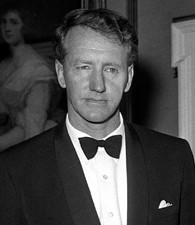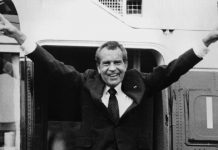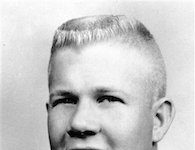On March 2, 1970, Prime Minister Ian Smith severed Rhodesia’s remaining ties with Britain in an attempt to protect white minority rule. It would be another nine years before Smith would assent to open elections, which would usher in black rule and the renaming of the country to Zimbabwe.
Rhodesia’s Declaration of Independence Not Recognized
After the British gave Zambia and Malawi their independence in the 1960s, Rhodesia sought its own formal recognition of independence. However, the British would not recognize the republic without a constitutional amendment that would shift power to the African majority.
The conservative Rhodesian Front (RF) party, led by Prime Minister Ian Smith, sought to maintain white rule over the country. Though Rhodesia had roughly 5 million blacks and fewer than a quarter-million whites, voter qualification laws ensured that the electorate was predominantly white.
In the 1965 election, the RF won an overwhelming majority, giving Smith the political power to declare independence over the objections of the British government. On November 11, 1965, Smith announced the Unilateral Declaration of Independence (UDI).
“There [can] be no happiness in this country,” Smith pronounced, “while the absurd situation continues to exist where people such as ourselves, who have ruled ourselves with an impressive record for over 40 years, are denied what is freely granted to other countries, who have ruled themselves in some cases for no longer than a year.”
The British called the UDI illegal, but they eschewed military intervention in favor of economic sanctions. The United Nations, which voted 102 to 2 to condemn the UDI, also imposed economic sanctions, the first time it had taken action against a country.
Smith refused to back down, and in March 1970 he declared Rhodesia to be a republic, introducing a new constitution and disbanding the parliament. In doing so, he broke all ties with Britain. The declaration was met with unanimous non-recognition worldwide, and countries began to shut down their consulates.
Sources in this Story
- History World: History of Zimbabwe
- Encyclopedia Britannica: Zimbabwe
- Time: Rhodesia: The White Rebels
- Fordham University: Modern History Sourcebook: Rhodesia: Unilateral Declaration of Independence Documents, 1965
- U.S. Department of State: Background Note: Zimbabwe: History
- PBS: Frontline: From Liberator to Tyrant: Recollections of Robert Mugabe
- Los Angeles Times: Mugabe: a tyrant from the start
- The BBC: Country Profile: Zimbabwe
The Bush War and the Road to Majority Rule
The 1965 UDI incited guerilla activity against the Rhodesian government by two black nationalist organizations: the Zimbabwe African Peoples Union (ZAPU), led by Joshua Nkomo, and the Zimbabwe African National Union (ZANU), led by Robert Mugabe. Guerilla warfare intensified in the early 1970s, and in 1976 ZAPU and ZANU reached an agreement to form the Patriotic Front (PF).
Weakened by civil unrest, economic sanctions and international pressure, the Rhodesian government began to reach out to ZAPU, ZANU and the United African National Council (UANC), a nonviolent black nationalist organization led by Bishop Abel Muzorewa.
In 1978, Smith agreed to an “internal settlement” with Muzorewa that granted universal suffrage. In the first open elections in April 1979, the UANC won a majority and elected Muzorewa as the first prime minister of the newly renamed Zimbabwe Rhodesia.
Even with the election of a black majority government, ZAPU and ZANU continued fighting, which hurt the new country’s bid for recognition. Muzorewa, Mugabe and Nkomo met with British leaders in London’s Lancaster House to discuss a settlement. On December 12, Britain reclaimed Rhodesia as a colony; nine days later, the parties in London agreed to hold new elections in February 1980, at which time Britain would relinquish Rhodesia as a colony and the country would be renamed Zimbabwe.
The newly formed ZANU-PF party won a majority in the February elections and chose Mugabe as the first prime minister of Zimbabwe.
Related Content
The Reign of Robert Mugabe
When Mugabe took office, many in Zimbabwe and internationally hoped that he could bring the country together under a fair democratic government. However, in his three decades as Zimbabwe’s head of state, the beloved freedom fighter has become a despised dictator whose brutal and corrupt regime has devastated the country.
Mugabe, in his aim to consolidate power and establish one-party rule, accused Nkomo of plotting a coup and arrested ZAPU members in 1982, inciting a five-year civil war. He became the country’s first president in 1987 and has cracked down on political opponents and suppressed public dissent to maintain his power. He has also introduced disastrous economic policies, such as his populist attempts to redistribute white-owned land to black Africans.
Zimbabwe today has rampant inflation, food shortages and one of the lowest life expectancy rates in the world. Mugabe nearly lost power in 2008 after ZANU-PF was defeated in elections, but he managed to retain the presidency through a power-sharing agreement with opponent Morgan Tsvangirai.
“What happened to the Mugabe I knew in the late 1970s still bewilders and disturbs me,” wrote PBS Frontline’s Stephen Talbot in 2006. “Even if he lacked Mandela’s transcendent humanity and compassion, Mugabe could have been an esteemed statesman and a popular president. Instead he has run his country into the ground, one more tyrant on a long-suffering continent, his people waiting for him to die.”
James Kirchick, editor in chief of the New Republic questioned the popular notion that Robert Mugabe was “a good man gone wrong” in a 2007 editorial. He wrote, “From the beginning of his political career, Mugabe was not just a Marxist but one who repeatedly made clear his intention to run Zimbabwe as an authoritarian, one-party state.”
Find the best Web sites for learning about the history and current issues of the conflict in Zimbabwe.
Background: History of Rhodesia
Rhodesia was named after Cecil Rhodes, a powerful entrepreneur who secured the mining rights to the area. It became a British protectorate in 1891, and by 1892 the population had expanded to 1,500 Europeans. The settlers of Rhodesia, like the American colonists, pushed for self-government early on, and in 1923, Rhodesia became a self-governing colony.
In 1953, the British government created the Federation of Rhodesia and Nyasaland, uniting Southern Rhodesia, Northern Rhodesia and Nyasaland in an attempt to create a stronger economic situation.











